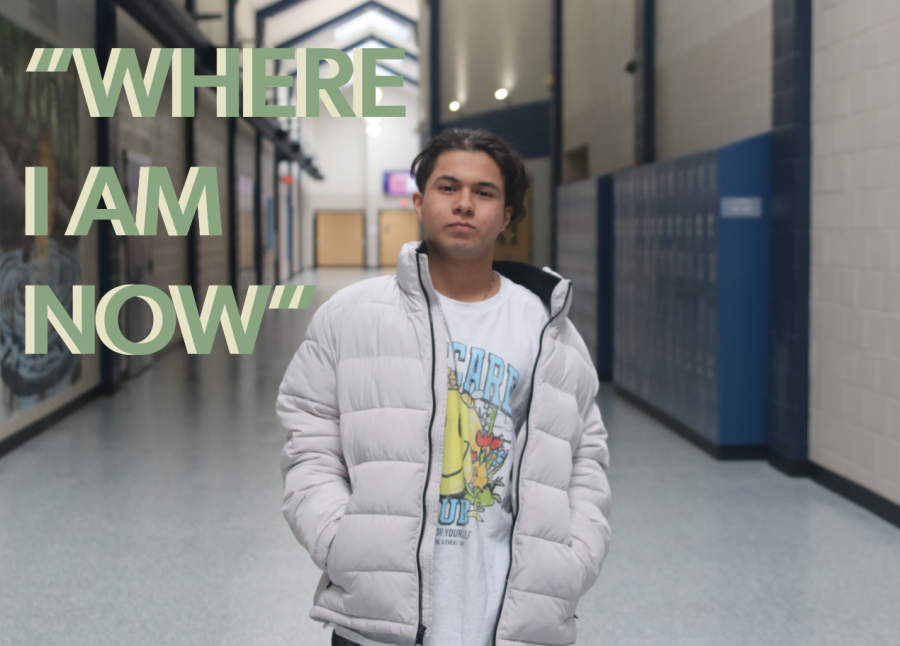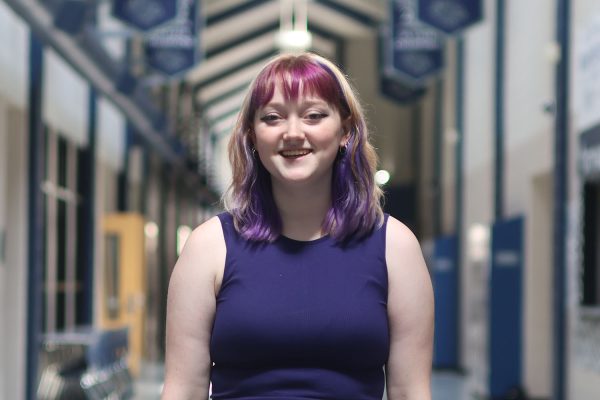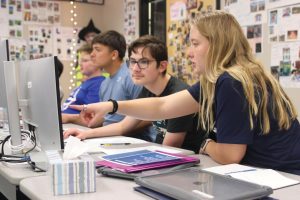Student shares his story of learning to provide for himself
Senior Isreal Caballero is an incredibly resilient student who has utilized many district provided resources in the face of hardships
February 13, 2023
The district regularly helps students struggling with homelessness, poverty and other obstacles by providing resources. One of these students is senior Israel Caballero, who moved to Kansas from Mexico and lives on his own.
Caballero was born in Chicago, and is thus a citizen of the United States, but grew up in Mexico with his family. Leaving represented a world of new opportunities for him, as well as an escape from possible dangers.
“[I left because] I have this opportunity to come here in the legal way and to find these opportunities,” Caballero said. “I mean, Mexico is not bad, but it’s dangerous [and] we don’t have the same opportunities. Even if you have a college degree it’s hard to find a job and it doesn’t compare with America.”
Caballero currently lives in a two room apartment with a friend of his uncle, which is very different from the familial living aspects of Mexican culture.
“Mexican culture is more like living with family,” Caballero siad. “Think about your family [and] being close with them. So, I still have a good relationship with them, especially with my mom. It’s just you have a big family and you take care of them. I’m still thinking about them. I’m here because I have this idea to be like, this is my last name, but I take care of my last name of the legacy that I’m gonna make with [it].”
For Caballero, keeping himself motivated has helped him continue to be resilient. This, in turn, helps Caballero continue to reach his goals, like joining the Air Force after high school. Caballero describes the routine he follows to reach this goal.
“I wake up every morning and sometimes I workout in the morning, sometimes in the afternoon,” Caballero said. “[On silver days,] I have one class to study for the Air Force for the ASVAB, [the aptitude test for the military]. It’s a whole plan that I use. It’s just the same thing [I do] every week: keep studying, keep working out, keep working.”
Even with a consistent routine, life is not easy for Caballero. He works 40 hour weeks at Amazon in addition to being a student to support himself, pay rent and put food on the table.
“I mean, you go home and you are expecting to eat right because your mom makes it,” Caballero said. “I go home after being at school, after being at work, and I still have to go home and I still have to make my own food and it’s hard.”
With the help of district programs, like Free and Reduced Lunch and getting books and school fees waived, Caballero has been able to make ends meet. But these are not the only resources that can help students who are struggling economically.
According to assistant superintendent Alvie Cater, 14.2% of the district’s students are considered economically disadvantaged. The district is, in many ways, limited in what they can do to help these students.
“We do have families who are struggling financially so some of those families because of the amount of income they have each year, they do qualify for free and reduced meals,” Cater said. “[Otherwise], as a public school district, there really is just not a lot we can do to help families that are struggling financially other than through free and reduced benefits.”
Luckily, according to Cater, the district has a lot of connections with people and organizations who are willing to help support those in need.
“We’ve had other families anonymously provide donations or support to help other kids and other families,” Cater said. “I know that our staff has done the same thing where they give out their personal resources to help. Our school social workers and our school counselors do an excellent job once they become aware of a student’s needs. Some of the schools have a needs closet and those have personal hygiene items, some gently used clothing, and also some ready-to-eat type meals. We have also partnered with other agencies in the county for students who qualify and so it’s just really trying to connect families to those other resources.”
One of these county agencies is United Community Services. Kristy Baughman, who works with UCS as the Director of Education and Planning, explains how organizations like UCS can be a resource for working towards a solution.
“I think that we’re a good resource, one, for data,” Baughman said. “We have a lot of information that we collect on a regular basis, especially relating to poverty. Another place [we can help] is really resources and networking. We work with so many partners around the county.
Resources like these are critical, especially with rising poverty rates in Johnson County. According to a UCS newsletter citing the U.S. Bureau of Labor Statistics, the poverty rate for young adults has rose from 9.4% to 14.4% between 2019 and 2021. This age range includes 18-24 year olds, and is the group that Caballero falls under.
Though Caballero has faced many struggles, having access to resources offered by the district has helped him to lead the life he wants to live.
“I have this idea of comparison: what I was and where I am now,” Caballero said. “Either way you go you have to do things for yourself. But here it’s more like you have the support of actually the government or the students and the school, which is like a natural help.”














